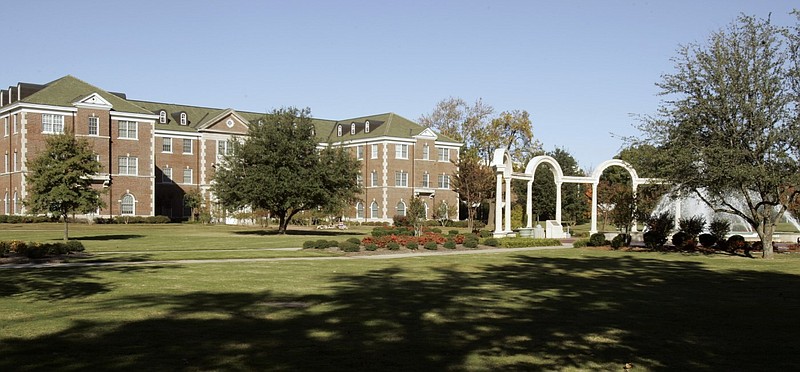2 state colleges’ awards for women face U.S. bias inquiries
by EMILY WALKENHORST ARKANSAS DEMOCRAT-GAZETTE | December 6, 2020 at 3:43 a.m.

Two Arkansas universities have joined the fast-growing ranks of institutions under federal investigation for offering “single-sex scholarships” — namely, scholarships for women.
The U.S. Department of Education this year has opened at least 120 Title IX investigations into colleges and universities for offering “single-sex scholarships.” Two of those investigations were at the University of Central Arkansas and the University of Arkansas at Little Rock.
The number of investigations of “single-sex scholarships” opened in 2020 and still active top the number of active investigations filed this year in every other Title IX category, including investigations into sexual violence and sexual harassment. Those categories combine for only 103 investigations opened this year and still active, according to federal data analyzed by the Arkansas Democrat-Gazette.
The increase in the scholarships investigations is largely because of complaints filed by a single person, said Brett Sokolow, president of the Association of Title IX Administrators. Mark Perry, a finance professor at the University of Michigan-Flint, has filed numerous complaints alleging unfairness to men. In blog posts and letters, Perry has likened his fight against single-sex academic programs, such as science summer camps for girls, as an effort to “end gender discrimination” and to end “gender apartheid.”
In many cases, the investigations have pressured colleges to either discontinue their women-only scholarship programs or make them available to men, as well. If successful in Arkansas, about a dozen privately funded scholarships would have to change.
O p p o n e n t s of t h o s e changes contend that the female-only scholarships and programs are critical to encouraging greater representation of women in certain academic fields dominated by men, such as science and engineering.
While 127 investigations into single-sex scholarships and 69 investigations into single-sex programs remain open, Sokolow acknowledged female-targeted scholarships and programs are ubiquitous. He said hundreds or thousands of schools could have such programs or scholarships.
“It’s pretty widespread,” he said.
Under Title IX, Sokolow said, academic institutional scholarships, whether provided by the institution or its foundation, must be distributed roughly 50-50 to women and men. That’s regardless of the student-body makeup.
In contrast, in athletics, the distribution must be proportional to the gender makeup of the student body. If 60% of students are women, roughly 60% of the school’s athletes should be women and roughly 60% of the dollar amount of athletic scholarships awarded should go to women.
Federal Equity in Athletics Disclosure Act data, examined by the newspaper, show that proportional distribution of athletic scholarships is not followed almost anywhere in Arkansas. Most student-athletes are male, and they receive most of the scholarship money. The scholarship money, however, is often distributed proportionally to the gender makeup of the student-athlete populations.
The idea behind those rules assumed that more men would play sports and that student bodies would be about 50-50 men and women, Sokolow said.
Only one of those assumptions proved to be true in the long run. Once outnumbered, more women now attend college than men, nationwide and in Arkansas.
Data provided by a handful of Arkansas universities show that most institutional academic scholarship money, not including foundation-provided scholarships, goes toward women. In most years, on average, however, female students received less in aid than the average male student.
The Arkansas Democrat-Gazette requested the information from all 10 of Arkansas’ traditional four-year public universities and many said they did not track it or did not respond. The newspaper obtained data outside of athletics from only five.
Colleges and universities commonly fail to track academic scholarship distribution data by race or gender, Sokolow said. But the investigations are causing many to start paying attention, he said.
The federal education department is investigating the University of Central Arkansas and the University of Arkansas at Little Rock for women-only academic scholarships financed by their foundations.
The Arkansas Democrat-Gazette obtained investigative records so far in each case. The complaints weren’t included and the complainants’ identities have been redacted.
The federal education department is investigating seven scholarships awarded to UCA students and at least three awarded to UALR students.
Many of the scholarships target academic programs in which women are less represented, such as science. Some are for business students.
Neither university offers scholarships for only men.
UALR also is under investigation for a single-sex program, based on a complaint from a person who was denied admission into a program.
The investigations have sought data on scholarships awarded, which the universities told the newspaper they have complied with.
The investigations remain open, though many colleges have attempted to resolve the complaints prior to any formal findings, by ending the scholarship programs or opening the scholarships up to more than women.
Sokolow often advises schools to do that. That’s easier when schools are the sponsors of the scholarships, he said. If the scholarships are provided through the foundation, the benefactor must agree to change the terms of the gift.
Others argue the schools shouldn’t have to do those things and the complaints should be tossed.
Earlier this year, the National Women’s Law Center, which has spoken out against the single-sex scholarship complaints, published a guide arguing that academic programs and scholarships targeting a single gender are allowed under Title IX. The guide notes the law states that schools can “take affirmative action to overcome the effects of conditions which resulted in limited participation therein by persons of a particular sex.”
“For example … a school can provide targeted programming to women in science, technology, engineering, and math (STEM) because women are underrepresented in these fields,” the law center contends. “Schools use affirmative action to promote diversity and to ensure that past discrimination and exclusion do not perpetuate ongoing exclusion.”
